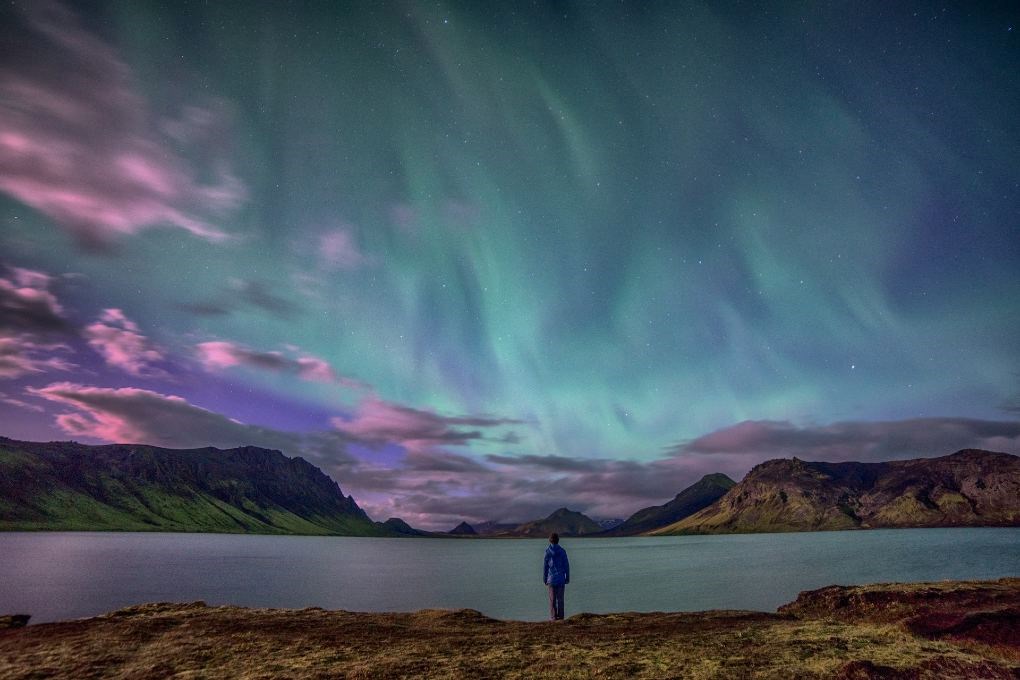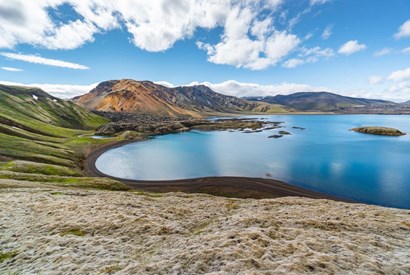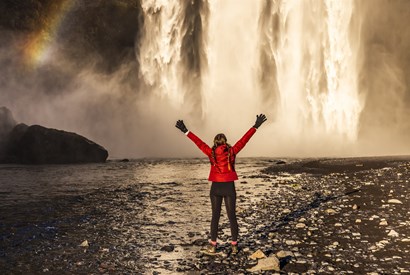Winter in Iceland: Where to Go and What to Do

Planning a winter getaway? While you might not automatically think of Iceland for your December or January vacation, there are many, many reasons why you might decide to holiday in Iceland this winter, rather than heading for sunnier shores. With the destination’s winter wonderland setting and plenty of things to do in Iceland in winter, you’ll be able to easily fill your itinerary with memorable moments and unforgettable excursions.
So, what do you need to think about if you’re planning a winter trip to Iceland? Here’s everything you need to know about Iceland winter activities, weather, driving conditions and more, plus our top tips for planning the best trip possible.
What to Expect From Winter in Iceland
Yes, the country’s name is Iceland. You probably expect it to be, well…filled with ice. And that’s definitely the case in the wintertime, even if it’s not the case all the time. Iceland has two primary seasons — spring and fall are barely blips on the calendar — with lush greenery and wildlife aplenty through the summer, April to September, and plenty of snow and ice in the winter, October through March.
Just because we’re covered in ice half the year, though, that doesn’t mean you should shy away from spending winter in Iceland. All that snow and ice make up for a magical environment wherein the landscapes are dazzling white, the waterfalls are frozen solid, and the skies are dark and filled with vibrant flashes of colour, thanks to the northern lights.
The northern lights are one of the primary attractions in Iceland during the winter months, with travellers coming from all over the world to chase down the auroras throughout the country. Seeing the northern lights in person is an amazing experience and one that many will never be able to enjoy in their home countries.

Don’t worry, though — the snow isn’t constant, so you won’t be battling squalls or blizzard-like conditions during your entire trip. However, the weather is slightly unpredictable, which is the case most of the year in Iceland, so you’ll need to plan accordingly.
You can still do and see many things in Iceland during the winter months, and you won’t run out of things to do in Iceland in winter. Those “things to do” just might look a little different. For example, you can still go see all of Iceland’s waterfalls, but they’ll just be frozen. You can still see the volcanoes. You can still go to the beaches, they just might be filled with diamond-like ice. You can still go on a hikes, but on a glacier instead of across a grassy field.
Otherwise, though, Iceland also offers many things to do in winter that you can only do during the winter, never in the summer. Beyond seeing the northern lights, which aren’t visible in the summer, you can also enjoy snowmobiling, ice skating and other winter sports.
As far as Iceland winter weather and temperature go, expect warmer temperatures in the southern parts of the country. Around Reykjavik, you can expect temperatures to hover around 0 degrees Celsius, or 32 degrees Fahrenheit, through the winter, with lows in the negatives Celsius, or around 23 degrees Fahrenheit. Sometimes, temperatures rise up to the single Celsius digits, or above freezing. Prepare for unpredictable snow and strong, frigid winds, with the weather getting colder and more unpredictable, and potentially hazardous, the further north you travel.
Need more information about what to expect during a winter trip to Iceland? You can get a month-by-month breakdown of what to expect during this season, with our guides to spending October, November, December, January, February and/or March in Iceland.
Think you might rather visit in the summer? We have you covered there, too. Here’s our guide to spending summer in Iceland.
The Best Way to See Iceland in Winter
What’s the best way to see and get around Iceland during the winter months? No matter what you have planned for winter activities in Iceland, we always recommend a road trip. So long as you’re comfortable with driving in a little snow, you’ll find that a winter road trip throughout the country is an excellent option.
Why?
Well, there are a few reasons.
For one, getting around Iceland without a rental car is nearly impossible. Without one, you’ll be stuck with taking the very minimal public transportation that’s only available in Reykjavik, or with taking high-priced tours that are only available if you want to see some of the top sites in the country.
On this note, and secondly, if you want to see some of Iceland’s top sights, you’re going to have to get off the beaten path. Some of Iceland’s most beautiful scenery, including waterfalls, volcanoes and beaches, aren’t going to be accessible via a guided tour.
In other words, if you want a fair amount of freedom during your trip, don’t want to be stuck only seeing the city, and want to see things off the beaten path, you need to rent a car.
That said, if you do like the idea of a guided tour, or just aren’t comfortable with your driving skills in a new country, snow or not, we do have a few recommended tour options.
If, though, you do decide to rent that car, here’s what to keep in mind.
What vehicle do you need for winter in Iceland?
If you decide to take a winter road trip in Iceland, you absolutely need to rent a 4x4 vehicle.
While many of the roadways in the south of Iceland and around Reykjavik are kept clean of snow and ice, and are pretty well-travelled, so you don’t necessarily need to worry about being stranded or having an accident, so long as you’re a skilled driver, a 4x4 rental car offers traction and stability that will make you and your fellow travellers much more comfortable.

Remember — Iceland’s weather is unpredictable in the winter especially, so a snow storm can pop up out of nowhere while you’re driving, meaning you’ll need to stay safe with the help of a 4x4 car until the snow ends or you reach clean roadways. Not to mention, a 4x4 vehicle comes with added storage space to hold all your winter gear and clothing, as well as amenities to make you more comfortable in the cold, like heated seats.
If you’re worried a 4x4 vehicle will be a little out of your price range, don’t be. You can find 4x4 vehicles available at many different price points, from Lava Car Rental.
Still a little hesitant about driving on Iceland’s roads in the winter? Check out our Iceland winter driving guide.
Where to Go in Iceland in the Winter
If we’ve convinced you that you need to visit Iceland in the winter, here’s what you need to know about where to go in Iceland in the winter, as well as the best things to do in Iceland in winter.
The Best Place to Go in Iceland in Winter
Hands down, no argument about it, the best place to go in Iceland in the winter is South Iceland.
This is true for a few reasons.
One, South Iceland will offer better weather in the winter months. Better weather means better, safer road conditions. Not only are the more northern areas of Iceland more difficult to traverse in the winter, some of them are completely impassable or closed off to all vehicle traffic, including in the Westfjords and Highlands.
Two, South Iceland offers lots to do in the winter months, so you can fill your itinerary with a range of classic Iceland activities, without feeling like you’re missing out on anything at all. Beyond Reykjavik, popular things to see in the South of Iceland include the Blue Lagoon, Golden Circle, waterfalls like Skogafoss and Seljalandsfoss, Vatnajokull National Park and the Jokulsarlon lagoon.
If you want to see the best of the South of Iceland, you can do so on either a 7-day road trip or a 10-day road trip.
The Best Iceland Winter Activities
Whether you’re in the South of Iceland or elsewhere, what should you do while you’re in Iceland in the winter? These are our top recommendations.
Northern Light Chasing
As mentioned, northern lights chasing is one of the most popular wintertime activities in Iceland. Travellers come from all across the globe to see the northern lights.
Because you never know when and where the northern lights will show up, and because they often show up outside of the city, where light pollution is as minimal as possible, you need to rent a car if you plan on enjoying this activity during your trip. That way, you’ll be able to head out to find the lights based on the night’s weather and lights predictions, and go wherever the lights take you.
Check out our full guide to chasing the northern lights on our blog, to learn more about what you need for a northern lights chasing excursion.

Glacier hiking
Hiking is an extremely popular activity in Iceland, but while hiking in the summer means scaling mountains and traversing green pastures, hiking in the winter means strapping on your snowshoes or crampons and hiking across a glacier.
Iceland is filled with famous glaciers that you can see, up close and personal, with the help of a guide. You’ll find guided glacier hiking experiences available in three primary spots: Skaftafell National Park, Solheimajokull and Breidamerkurjokull.
Skaftafell offers a range of glacier hiking options, as well as ice climbing. Choose from between hikes of varying lengths, whether you’d prefer a shorter three-hour experience, or a longer five-hour hike.
If you go to Solheimajokull, you’ll enjoy convenient access to three-hour glacier hiking tours, as well as ice climbing experiences, all within a short drive of Reykjavik.
Then, further in the south of Iceland, there’s the Jokulsarlon glacier lagoon and Breidamerkurjokull. There, a glacier hike at Breidamerkurjokull is the perfect accompaniment to a day spent exploring the rest of the region.
Again, glacier hiking experiences can only be enjoyed with the help of a trained guide. Otherwise, these experiences can be potentially hazardous. Do not attempt a glacier hike on your own.

Ice caving
Just like winter is the best time to enjoy glacier hikes in Iceland, winter is the best time to enjoy ice caving in Iceland, too.
What is ice caving? Essentially, as glacier water flows over the summer and then eventually freezes as the temperatures cool, the waters form pockets that are large enough to go inside and explore, called ice caves. Because they melt, flow again, and reform each and every year, the ice caves are always different.
Going inside an ice cave is a unique experience, allowing you to glimpse the interior of the glacier. The ice shines in shimmery blues and whites, creating an otherworldly environment that you won’t want to miss.
Like glacier hiking, ice caving does come with its hazards, so is only an option if you’ve hired a reputable guide. Your guide will most likely take you to one of three primary ice caving spots: Vatnajokull, Katla or Langjokull.
Vatnajokull is the largest glacier in Europe and, since it also offers glacier hiking, you can book tours to experience both glacier hiking and ice caving while you’re there.
If you go to Katla, you can see the unique ice caves tucked beneath the volcanic core, filled with black ice. The Katla ice caves are some of the few that can be seen all year long, so if you miss a winter trip to Iceland, still consider visiting them during a trip some other time of the year.
Lastly, the ice tunnel at Langjokull is especially interesting because it’s actually a man-made ice cave! Like Katla, you can see this man-made tunnel all year-long, with a tour.

Snowmobiling
Iceland’s heavy winter snowfall makes snowmobiling a breeze. Enjoy exciting excursions with the help of a guide, zipping across glaciers and icy plains on your very own snowmobile. This is an activity sure to get your blood pumping!
Here are some of our favourite snowmobile tours to book in Iceland.

Hot spring bathing
Pack your swimsuit! No, you won’t be lying out on the beach during your Iceland winter vacation, but you’ll still need it. Regardless of the time of year, one of the best things to do in Iceland is to take a dip in one of our many hot springs.
There are hot springs for every type of traveller. The more adventurous types may want to hike out to a remote hot spring far from civilization. The more luxurious travellers may want to visit one of the hot springs that have been developed into a spa. Whatever your preference, you’ll have your pick, as there are hot springs located all across the country.
Read our full hot springs guide to learn more.

What to Keep in Mind When Planning an Iceland Winter Trip
Already started planning your Iceland vacation itinerary? Before you arrive, there are a few things you’ll want to keep in mind, so you have the best trip possible.
Don’t overdo it.
As you plan your itinerary, don’t make the mistake of thinking that, just because Iceland is a small island country, that you can see and do everything it offers in just one trip. In fact, many people spend a week or longer here and still only see a small portion of the country.
With this in mind, don’t pack your itinerary with so much to do that you either end up rushing around from spot to spot, not fully enjoying every experience, or try to cram in so much that you end up not seeing the things you really want to see.
Be realistic about how much time you’re spending in Iceland and then plan accordingly. Opt for under-filling your itinerary versus over-filling it, as, especially in the winter, you never know when the Iceland weather is going to interrupt your plans. Plus, if you find yourself with a little extra free time, you’re all the more likely to stumble upon an Iceland adventure that you never would’ve planned on your own.
Make sure the things you want to do are actually open.
As we detailed above, there are some Iceland activities that are best experienced in the winter, or only possible in the winter, such as some ice caving experiences and northern lights viewing. However, there are some activities that aren’t an option at all in the winter.
If you wanted to see the Icelandic Highlands, for example, that’ll be out of the question in the winter months, as the region is completely shut off to road traffic starting in about September or October.
Before you finalise your plans, check to make sure what you want to do in Iceland is actually possible, given the season.
Stay up to date on the weather and road conditions.
Both before your trip and during, be sure to stay up to date on the weather forecasts and road conditions. Doing so before your trip can give you an idea of what to expect, while doing so during your trip will keep you safe. You’ll find weather forecasts on www.vedur.is and road conditions on www.road.is.
Hire a guide when needed.
While renting a car for your Iceland trip means not needing guided tours for every little experience you want to enjoy around the country, you will still need guides for certain activities that come with safety risks. Don’t put your safety or others’ at stake, and hire a guide when enjoying activities like ice caving or glacier hiking.
Ready to Book Your Winter Trip?
If you’re ready to book your winter trip to Iceland, it all starts with making sure you have the right set of wheels to get you around. Check out Lava Car Rental’s extensive selection of winter-ready 4x4 vehicles to see what might best suit your needs. From luxury 4x4 SUVs to 4x4 vehicles to fit the entire family, we’ll outfit you with the safest, most comfortable ride for your Iceland winter road trip.
Not sure yet if a winter road trip around Iceland is right for you? Explore all your Iceland travel options, by perusing the many Iceland travel guides on the Lava Car Rental blog.




